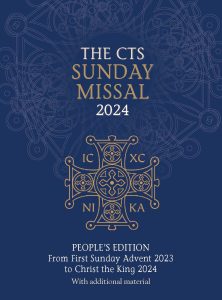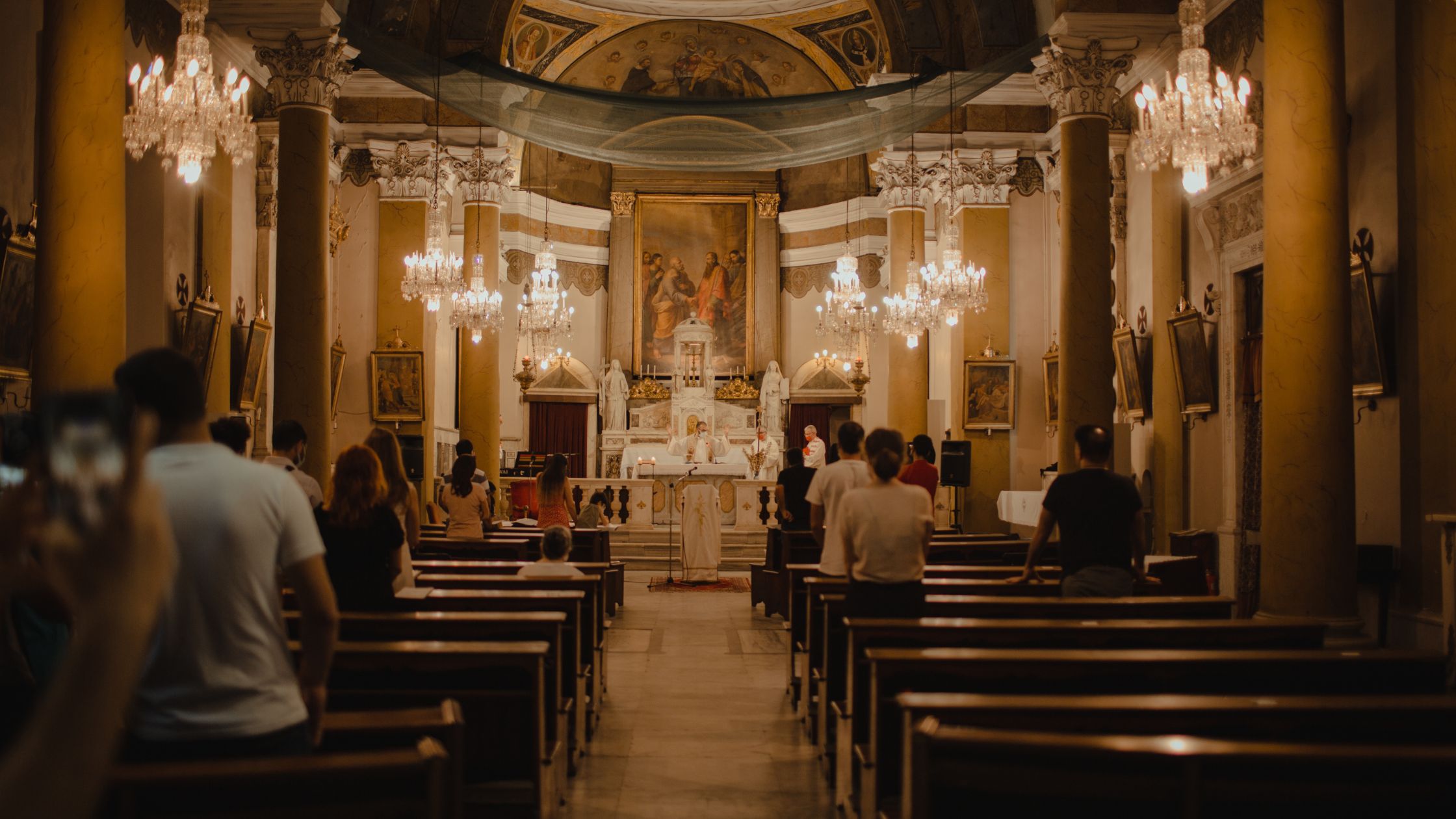When was the last time you walked out of Mass and felt truly different, knowing that what you have just experienced was something momentous and life-changing? It is very easy to go to Mass out of habit and to forget the significance of what we are participating in. Here we suggest ten ways that you can more fully appreciate the Mass, with the help of The CTS Sunday Missal 2024.
1. Read and Pray With the Mass Readings in Advance
When we go to Mass, we have the honour of encountering Christ Himself, who is present in our midst in His Word. We can hear God speak to us and guide us on our way to salvation. It is important then to get as much from the Mass readings as possible and a particularly helpful way to do that is to read and pray with the Mass readings in advance. Read the readings slowly and consider: what is God saying to me through this reading? Is there a particular word or phrase that stands out to you?
2. Pray Before Mass
Since the Mass looks ordinary to our own eyes, we need the grace of God to even begin to comprehend the beauty and treasure of what we are about to experience. That’s why it’s really important to pray before Mass, to ask God for His help. Here is one prayer found in The CTS Sunday Missal 2024:
O God, to whom every heart is open, every desire known and from whom no secrets are hidden; purify the thoughts of our hearts by the inspiration of your Holy Spirit, that we may perfectly love you, and worthily praise your holy name. Amen.
3. Read the Readings as They Are Being Proclaimed
Although God is present at the Mass in His Word, it’s easy to be distracted, to zone out, or to simply forget the Word after it is proclaimed. Yet this would be to miss out on something crucial because this is when God speaks to us. When the God Who created us speaks to us, His words can have a profound impact on us. However, when we read the readings from our missal as they are bring proclaimed, we can more easily listen to what God has to say and find meaning for our lives in His Word.
4. Let the Prayers of the Priest Guide Your Own Prayers
Many Catholics know by heart the responses said by the people during Mass, but many don’t know the parts said by the priest. The advantage to being familiar with all the prayers of the Mass, such as the Eucharistic Prayer, is that it helps us to appreciate the mystical reality happening around us. This is even more the case when the prayers change for the different seasons of the Church. For example, do you recall this prayer?
For by your gracious gift each year
your faithful await the sacred paschal feasts
with the joy of minds made pure,
so that, more eagerly intent on prayer
and on the works of charity,
and participating in the mysteries
by which they have been reborn,
they may be led to the fullness of grace
that you bestow on your sons and daughters.
This is Preface 1 of Lent and is one of four Prefaces that can be prayed throughout Lent, so it’s easily forgotten. Nonetheless, the words are moving and can inspire your Lenten journey. By reading through the prayers of the Mass, either during the Mass as they are being prayed by the priest, or at home to study and pray with during your own personal prayer time, the prayers can deepen not only our appreciation of the Mass but also our faith.
5. Meditate on the People’s Prayers of the Mass
Have you ever considered the meaning of the words we pray at Mass? They are easy to say during Mass, but we can often do so robotically, without giving any thought to what we’re praying. Even the Our Father, a prayer that most Christian children learn at a young age and which you could probably recite in your sleep, is easily spoken without being properly prayed, with a proper meditation the words. They are worth praying with outside of the Mass so that when we pray them during the Mass, we’re fully conscious of what we’re praying and what the words mean.
6. Pray Before Receiving Holy Communion
Sadly many Catholics don’t believe in the Real Presence of Jesus. That is, that Jesus is truly present body, blood, soul, and divinity in the Eucharist. The Eucharist isn’t a symbol and neither is it merely blessed bread – it is Jesus Himself. Even among Catholics who know this truth, however, it is hard to fully appreciate what you’re about to receive. The reception of Holy Communion is a most special part of the Mass: this is the time when we receive Christ’s Body, offered for each of us. This is a special moment that needs to be prepared for. Just as we need the grace of God to fully appreciate the significance and the mystical reality of the Mass, we likewise need God’s help to believe that what looks like bread has actually become the Body of Christ. So we can pray that God will help us to receive worthily, we can pray to believe what we can’t see, and we can tell the Lord how much we love and desire Him. Prayers before Communion can be found in The CTS Sunday Missal 2024.
7. Make An Act of Spiritual Communion When Unable to Receive
From time to time, we may have a grave reason for not being able to receive the Eucharist. When we cannot do so, we can tell God how desperately we wish we were able to receive Communion and, through our heartfelt desire, we can still receive the beneficial effects as if we had been able to receive. St Thomas Aquinas said:
The effects of a sacrament can be received by desire. Although in such a case the sacrament is not received physically . . . nevertheless the actual reception of the sacrament itself brings with it fuller effect than receiving it through desire alone.
Taking this deep, heartfelt desire to receive Communion, we can invite the Lord to “come at least spiritually into my heart” and beg Him: “Never permit me to be separated from You.” By praying an Act of Spiritual Communion, using the writings for example of St Alphonsus Liguori or St Thomas More found in The CTS Sunday Missal 2024, we acknowledge the gravity of what we are being deprived of, which therefore helps us to better appreciate the gift we are given in the Eucharist.
8. Pray After Receiving Holy Communion
Once we have received Jesus, it is important that we take some time to acknowledge in our hearts Who it is that we have received. This is Jesus, the Son of God, Who has permitted us to consume Him. If we truly believe this, we can’t just return to our pew as though nothing has happened, but we must truly offer our gratitude for the gift we have been given. There are a number of prayers we can say at this point to guide us, for example, “My good Jesus, I thank you with all my heart. How good, how kind you are to me. Blessed be Jesus in the most holy Sacrament of the Altar.” In this way, we ensure that we acknowledge what God has given us and we don’t let our reception of Communion pass as though we had just been given a piece of bread.
9. Say a Prayer of Thanksgiving After Mass
Once the Mass is over, it’s tempting to dash off to get on with the rest of our Sunday, or to take the opportunity to chat with fellow parishioners not seen in a while. However, this would be to again forget the importance of what has just happened: we were at Calvary, at Jesus’ sacrificial death. If you had physically seen Jesus dying on the cross with your bodily eyes, would you be able to just walk away afterwards and get on with your day? Or would you take the time to pray about what you had just witnessed, to thank God for having died for you, and ask Him to help you along the path to salvation? If we move on with our hearts the moment the priest or deacon has said the dismissal, or after the final hymn, what does that reveal about what we believe has just happened?
It is in our thanksgiving after Mass that we truly show that we comprehend what the Lord has just done for us. There are many prayers from the saints and from the tradition of the Faith which you can use to guide your heart in giving thanks, such as the Anima Christi:
Soul of Christ, sanctify me. Body of Christ, save me. Blood of Christ, embolden me. Water from the side of Christ, wash me. Passion of Christ, strengthen me. O good Jesus, hear me. Within your wounds hide me. Never permit me to be parted from you. From the evil Enemy defend me. At the hour of my death call me and bid me come to you, that with your Saints I may praise you for age upon age. Amen.
The graces received from this act of thanksgiving will compensate you for the few minutes you lose by not leaving immediately.
10. Deepen Your Eucharistic Devotion at Adoration
The service of Benediction developed during the Middle Ages during the Corpus Christi processions in which the Blessed Sacrament was held up for veneration. The service was subsequently used at other times throughout the year as an opportunity to give thanks for the Mass and adore Christ present under the form of bread. Today, the Church encourages this rite to be celebrated in the context of a longer period of reading, prayer and reflection.
Eucharistic Adoration can help us to deepen our experience of the Mass because of the intimate connection between the two. As Pope Benedict XVI explained: “In the Eucharist, the Son of God comes to meet us and desires to become one with us; eucharistic adoration is simply the natural consequence of the eucharistic celebration. Receiving the Eucharist means adoring him whom we receive. Only in this way do we become one with him, and are given, as it were, a foretaste of the beauty of the heavenly liturgy.”
Go Deeper Into the Mass With The CTS Sunday Missal 2024
 This paperback Sunday Missal for 2024 offers a practical and comprehensive solution for your Mass needs:
This paperback Sunday Missal for 2024 offers a practical and comprehensive solution for your Mass needs:
- Masses and Readings for Every Sunday and Solemnity (UK & Ireland) in the 2024 liturgical year.
- Coverage from the First Sunday of Advent in 2023 through to Christ the King in 2024.
- Conveniently arranged in chronological order according to the calendar.
- Inclusion of all significant feasts and seasons.
- Side-by-side presentation of the Latin and English texts.
- Thoughtful introductions by Pope Francis.
- Musical accompaniments for the Mass.
- Acts of Spiritual Communion for those unable to get to Mass.
- Prayers from the saints for both before and after Holy Communion.
- Prayers for before and after the Mass.
- The complete Rite of Eucharistic Exposition & Benediction.
All of these essential components are thoughtfully compiled within a lightweight paperback volume, making it the ideal Sunday Missal for every Catholic to carry to Mass.
The CTS Sunday Missal is in stock and available to order now.
